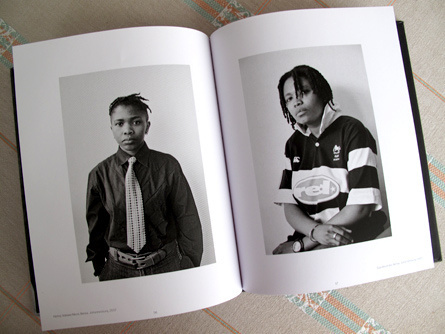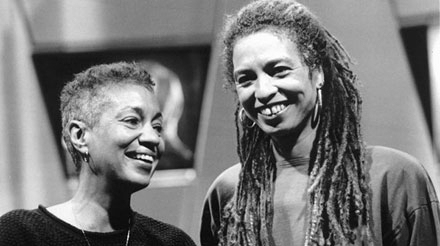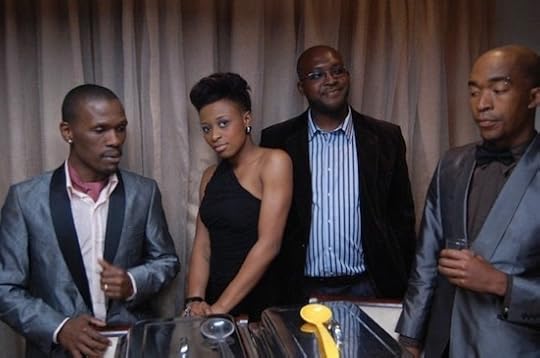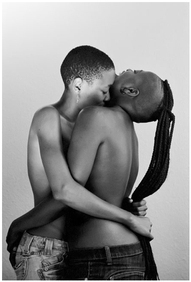Sean Jacobs's Blog, page 553
March 9, 2012
Preview: London Lesbian & Gay Film Festival

A coincidence? Surely not. At the same time as the Out in Africa festival in South Africa celebrating lesbian and gay film (see earlier post), runs the prestigious London Lesbian and Gay film festival. At this year's festival, a few films stand out that deal with the problems that African LGBT people face.
On Saturday March 24, two South African films are screening.
First, 'Difficult Love' (2010) by Zanele Muholi and Peter Goldsmid, which follows the journey of celebrated photographer Muholi as she 'navigates the politically charged environment of her native South Africa where legalized homosexuality has done little to stop the murder and 'corrective' rape of black lesbians.'
This film sounds fantastic, as Muholi's photographic practice attempts to both map and archive a visual history of black lesbians in post-Apartheid South Africa, and this lends itself well to the moving image. Her photographs are stark, black and white, unrelenting and fearless portrayals of love, sex and intimacy amongst the lesbian community. In her beautiful Being series (2001), she lifts a veil on HIV/AIDS and lesbian relationships, showing how prevention programming is failing lesbian women, while the photographs capture women in intimate, close positions together, celebrating their form.
Her statement of intent is strong and clear, she is writing black African lesbians into a cultural and visual inventory;
"In the face of all the challenges our community encounters daily, I embarked on a journey of visual activism to ensure that there is black queer visibility. It is important to mark, map and preserve our mo(ve)ments through visual histories for reference and posterity so that future generations will note that we were here."
The brilliant site African Art in London reviewed Difficult Love from its screening at the South London gallery in August:
"The film is not wholly depressing… there are flashes of determination and even humour, and what really comes across is the tenderness between couples who find love and laughter together even in seemingly impossible circumstances. It's tough viewing, but I can't recommend Difficult Love highly enough…"
You can watch the film here, but you'll have to register to IMDB first.
Second in this billing is 'Waited For' (2011) by Nerina Penzhorn, a documentary exploring the prejudices toward multi-racial lesbian families in South Africa. The complex issue of white lesbian couples adopting black children is approached with a true tenderness. Here's a trailer:
Other films to see — the classic A Place of Rage (1991) by Pratibha Parmar, featuring the formidable women fighting for African America rights, women's rights, and lesbian and gay rights. Interviews with Angela Davis, June Jordan and Alice Walker are still exciting and illuminating records of the lengths black women in America went to change their societies. You can watch a part of the film here (the Prince 'Sign of the times' soundtrack is absolutely perfect).

Jewelle Gomez writes of A Place of Rage that –
this lyrical film begins the much needed exploration of the Afro-American women who sustained and inspired the Civil Rights Movement of the 60′s. By shining an intimate light on some of our best known artists / activists Parmar eloquently reveals the power and poetry of the hidden faces. Her film is a visual embrace of who black women really are.
So, get to the BFI if you'd like to see some of the films, more details here. Or read Permanent Plastic Helmet's preview post on the festival here.
Or, if you are in Cape Town, then see the post on the festival Out in Africa, which runs from the 23rd of March to the 1st of April in Cape Town and Johannesburg.








Friday Music Bonus Edition
Our weekly round-up of new (and a little less new) music videos. First, this great video for 'I Am An African,' the first single of Dutch-Ghanaian artist Papa Ghana's EP 'I Am An African.' (The song came out last year).
The video for Nigerian singer Nneka's latest single, 'Shining Star' shot on the Canary Islands in Spain:
Harlem, New York based emcee Rugz D. Brewler's race conscious anthem, 'Cuz I'm Black':
Yasiin Bey (the former Mos Def) performed N.I.P. at Radio Nova in Paris this week (remember that track, including the line: "Prince William ain't do it right if you asked me, if I was him I'd put some black up in the family"). He also did this new 'Sunshine Screwface':
A music video for 'Past, Present and Future' off "The Extraordinaires" by the Zambian-Canadian collaboration, The Holstar and Teck-Zilla. It includes a cameo by Zone Fam:
And Sean is taking a group of New School students to Cape Town this summer. He plans to make this music video compulsory as a language lesson:








Preview: Out in Africa, South Africa's Lesbian & Gay Film Festival

Running from March 23 to April 1 in Cape Town and Johannesburg, Out In Africa is a showcase of films addressing the issues that confront those who are 'out'. It's a nice play on a colonialist turn of phrase too.
Screening this year is a new short documentary, Paving Forward, by filmmaker Mthokozisi Lembethe. It's a short and sharp documentary, but in 16 minutes manages to write black and lesbian activists into an important political past.
The film draws links between the fight for freedom under apartheid and lesbian and gay people, thus writing them into an important political and social history – a history from which LGBT people are so often obscured and ignored. Through interviews with activists, politicians and judges, this short documentary exposes the vast divide between constitutional freedom and equality, and its articulation within society. The scenes from David Kato's funeral – the Ugandan gay rights activist who was murdered in 2011 – testify particularly powerfully to the widespread intolerance and hatred toward gay and lesbian people across Africa. Another funeral, of a young lesbian in a township who was stoned, raped and killed due to her sexuality only serve to drive the point home even further; constitutional equality is only a symbol, it's only a start. Given that the South African constitution was the first in the world to outlaw discrimination on the basis of sexual orientation, this documentary makes startlingly clear how little this trickles down into contemporary society.
In a particularly moving scene, a late-life lesbian discusses her sexuality with her children. It's astoundingly moving, as her children struggle to grapple with their mother's identity, frustrated and no doubt fearing the consequences. But, Nosipho Mahola remains firm: "a person must know and own their life."
Another short film, Anders, by Werner Coetzee tells the story of two young people stuck in some South African white suburbia. The young man is clearly struggling with his sexuality, shown through long close-ups of his brooding face with little dialogue. A friend who works in the supermarket sees his anguish as a means to escape the suburbs, and move to the city. It's somewhat surreal, filmed in a dark grey palette, its strangeness deriving from the banality that surrounds the characters, struggling with their own difference, yet ironically they completely fit into the surroundings. The final scene, where the young man dresses in his dying grandmothers clothes and finally articulates his difference melts into the banality of the surroundings, he's wearing a head-scarf and old women's clothes, his act of defiance – his courage to explore his sexuality – in fact fits into the aesthetics of suburban life completely. Here's the trailer:
I'd particularly like to see The Secret (still at the top of this post), a film by Fanney Tsimong, described as a 'soap opera-like story of a gay man's affair with a closeted married man'. From the parts I've seen, it takes on a distinctly Nollywood feel – kitsch, garish colors, a TV feel, and a high-drama story of love and revenge.
Here is the synopsis:
"Generations actor Sipho "C-ga" Masebe's plays Mandla, openly gay, good looking and searching for love. He bumps into old college buddy Thoriso at a birthday party. Thoriso is married to the controlling Thuli, bent on nothing so much as getting ahead in the upwardly mobile world of the BEE nouveau riche. As Mandla chases Thoriso, worlds and assumptions are overturned and lives altered forever. The climax of the film is a credit to the writer – there's no preachy quick-fix, rather a reality check of what's really going on out there. Intriguing contemporary South African cinema."
Here is more information, and a full list of films screening during the festival.

March 8, 2012
The Afrikaans movie template
The creatives at South African satellite TV channel Kyknet — which also produces movies now — not only blatantly rip off American romantic comedy plotlines, but inhabit a South Africa where there is not a single black face to be seen. On the other hand, maybe they're being honest.








The White Nigerian
The Northern Nigeria repping White Nigerian (Lebanese Nigerian?), along with JJC, invites us all to a Hausa-Pidgin speaking world of cross-racial national identity. It's schticky, but the truth is, the world could use a little more exposure to stuff like this.
Download the track over at TIA.








How to celebrate International Women's Day
March 8, 2012. It's International Women's Day, and so how to celebrate? Over the weekend, The Independent on Sunday ran a piece entitled, "Revealed: The best and worst places to be a woman." 20 categories of "surprising results". Here's one you might find interesting: Best place to read and write: Lesotho.
Lesotho?
Literacy rates among women in Lesotho far exceed those of men. 95% of women can read and write, 83% of men. Boys drop out of a school at a higher rate than girls. The boys leave school to search for work, usually elsewhere. Much of the high literacy levels are a result of government decisions to actually invest in education. That's all to the good, and of course nothing of it is actually in the article.
Is that it for Lesotho? Its one shot at International Women's Day newsworthiness? When do the women of Lesotho become newsworthy and noteworthy?
You know the grim news already. Lesotho is a hard place to be, whether one is reading or not. The annual per capita is $1000, which means over half, maybe as high as 70 some percent, of the population is living in poverty. Speaking of money, all the banking assets of Lesotho are owned by foreign banks. The economy is allegedly shifting to an industrial base, which thus far has meant Chinese and Taiwanese owned garment and textile plants, where women work. Men largely continue to work in South Africa, especially in the mines. Currently, 33,000 Basotho men work in South African mines, which helps explain the high incidence of HIV and AIDS as well as tuberculosis. Lesotho still has one of the highest rates of HIV and AIDS in the world. Maternal mortality rates: also high. No guaranteed paid maternity leave, as in Swaziland, Papua New Guinea, oh yeah, and the United States of America. Unemployment is around 40%, life expectancy is around 40 years.
This is part of the context in which Basotho women currently live and organize. They are in labor movements, in local and national government, in protests and actions around big dams, around food prices, around … everything, including exclusionary practices.
Senate Masupha is the first-born child of David Masupha, the principal chief of Ha-'Mamathe, Thupakubu and Jorotane. When he died, his wife 'Masenate, who is Senate's mother, became chief. When she died, everything thickened. Brothers insisted that Basotho tradition precluded the daughter from assuming the chieftaincy. Senate shot back that that is a violation of her constitutionally guaranteed rights. She also argued it's nonsense. The Court decision is still pending.
Whatever the outcome, Senate Masupha is not going away, and that, hopefully, is a lesson for International Women's Day 2012. Instead of 'being surprised' by decontextualized so-called data from development think tanks (and worse), celebrate the difficult, everyday accomplishments of extraordinary, everyday women. Celebrate Senate Masupha.








The Africa is a Country guide to #SXSW

There's a lot going on for music fans at SXSW 2012. Plenty of AIAC favorites will be there, and fans of UK Bass, Cumbia Rock, Panabaynian Dancehall, neo-Jazz&B-Hop, Dubstep, Moombahton, Dutch House/Bubbling, Southern Rap former jailbirds, Hyphy/Mobb Music, Norteño, Classic New York Rap, Baile Funk, #OWS Rockers/Beatmakers, Balkan Beat Boxers, Afro Colombian, 3Ball, Chicano Rock meets Staten Island Rap, New York Rockers, and/or Dancehall will not be disappointed. There's a host of "African" artists as well.
Since we haven't (gladly) figured out what that really means, it's not so easy to discern from the listing who's repping for Africa or not, so I've gone ahead and scoured the list of hundreds of artists performing to pull out as many acts from or connected to Africa as I could (you'll have to do the panels and films on your own). Here's a little round-up of who to catch up with if you're in Austin next week:
I feel happy and privileged to be part of the All Africa Showcase sponsored by Society HAE and Spinlet. This two day event will showcase some of Africa's biggest artists, so I'm excited to be DJing both nights, and feel lucky just to see them perform:
On Thursday at Copa: Seun Kuti, Just A Band, Baloji, Spoek Mathambo and Sauti Sol.
On Friday at Beso Cantina: 2Face, M.I., Naeto C, Bez, Jim E-O and N-Dex.
Also making appearances during the week will be Nneka, Oddisee, The ReMINDers, Native Sun, Lazee, Michael Kiwanuka, Francis Mbappe, Janka Nabay and the Bubu Gang, The Debo Band, Wale, The Parlotones, and Buraka Som Sistema. I apologize if I missed anyone, please feel free to update us in the comments!
Oh, and since the original global-African-pop will be represented in legendary form, if you're in town try and catch up with the one and only Jimmy Cliff.
* Also present will be fellow AIAC blogger and filmmaker Anni Lyngskaer.








#SXSW #AFRICA

There's a lot going on for music fans at SXSW 2012. Plenty of AIAC favorites will be there, and fans of UK Bass, Cumbia Rock, Panabaynian Dancehall, neo-Jazz&B-Hop, Dubstep, Moombahton, Dutch House/Bubbling, Southern Rap former jailbirds, Hyphy/Mobb Music, Norteño, Classic New York Rap, Baile Funk, #OWS Rockers/Beatmakers, Balkan Beat Boxers, Afro Colombian, 3Ball, Chicano Rock meets Staten Island Rap, New York Rockers, and/or Dancehall will not be disappointed. There's a host of "African" artists as well.
Since we haven't (gladly) figured out what that really means, it's not so easy to discern from the listing who's repping for Africa or not, so I've gone ahead and scoured the list of hundreds of artists performing to pull out as many acts from or connected to Africa as I could (you'll have to do the panels and films on your own). Here's a little round-up of who to catch up with if you're in Austin next week:
I feel happy and privileged to be part of the All Africa Showcase sponsored by Society HAE and Spinlet. This two day event will showcase some of Africa's biggest artists, so I'm excited to be DJing both nights, and feel lucky just to see them perform:
On Thursday at Copa: Seun Kuti, Just A Band, Baloji, Spoek Mathambo and Sauti Sol.
On Friday at Beso Cantina: 2Face, M.I., Naeto C, Bez, Jim E-O and N-Dex.
Also making appearances during the week will be Nneka, Oddisee, The ReMINDers, Native Sun, Lazee, Michael Kiwanuka, Francis Mbappe, Janka Nabay and the Bubu Gang, The Debo Band, Wale, The Parlotones, and Buraka Som Sistema. I apologize if I missed anyone, please feel free to update us in the comments!
Oh, and since the original global-African-pop will be represented in legendary form, if you're in town try and catch up with the one and only Jimmy Cliff.
* Also present will be fellow AIAC blogger and filmmaker Anni Lyngskaer.








Film: "Imagining Emanuel"
Leo Goldsmith and Rachael Rakes, film editors at Brooklyn Rail, write about the documentary film "Imagining Emanuel" (trailer above), which recently played at the Museum of Modern Art's Documentary Fortnight in New York City:
The displaced man at the center of "Imagining Emanuel" [has a] passivity [stemming] from never having had the smallest thing handed to him, and not expecting any better. Director Thomas Østbye examines Emanuel's situation in an almost parodically clinical manner that only underscores its hopeless ambiguity. Against a black TV-studio backdrop, Emanuel calmly tells his story of stowing away on a boat to Norway, after first escaping civil war in Liberia as a child, and then eventually losing his mother, his only remaining known family, after relocating to Ghana. In Norway he is immediately delivered to immigration authorities, who not only do not believe his story, but are not able to successfully find out any contradicting evidence. Emanuel has no papers of any sort, and no government anywhere that could corroborate or disprove his identity. He waits, interminably, in in a stifling immigration prison while Norwegian agents oscillate over ways to make him another country's problem. With no education, no resources, and no ties to family or history, Emmanuel proves as slippery a subject for Østbye's mock-anthropological approach as he does for the grinding bureaucracies of immigration services, and ultimately … it's his lack of place that becomes his defining characteristic.








Emanuel's Identity
Leo Goldsmith and Rachael Rakes, film editors at Brooklyn Rail, write about the documentary film "Imagining Emanuel" (trailer above), which recently played at the Museum of Modern Art's Documentary Fortnight in New York City:
The displaced man at the center of "Imagining Emanuel" [shares a] passivity [stemming] from never having had the smallest thing handed to him, and not expecting any better. Director Thomas Østbye examines Emanuel's situation in an almost parodically clinical manner that only underscores its hopeless ambiguity. Against a black TV-studio backdrop, Emanuel calmly tells his story of stowing away on a boat to Norway, after first escaping civil war in Liberia as a child, and then eventually losing his mother, his only remaining known family, after relocating to Ghana. In Norway he is immediately delivered to immigration authorities, who not only do not believe his story, but are not able to successfully find out any contradicting evidence. Emanuel has no papers of any sort, and no government anywhere that could corroborate or disprove his identity. He waits, interminably, in in a stifling immigration prison while Norwegian agents oscillate over ways to make him another country's problem. With no education, no resources, and no ties to family or history, Emmanuel proves as slippery a subject for Østbye's mock-anthropological approach as he does for the grinding bureaucracies of immigration services, and ultimately … it's his lack of place that becomes his defining characteristic.








Sean Jacobs's Blog
- Sean Jacobs's profile
- 4 followers















